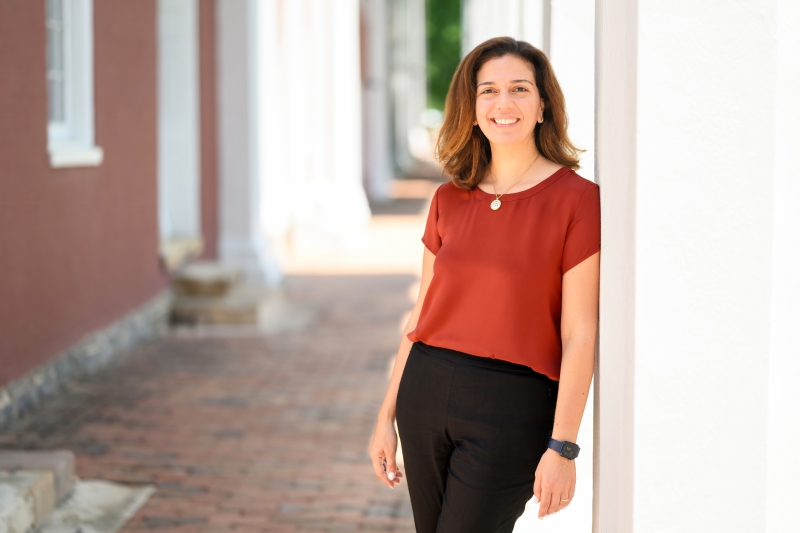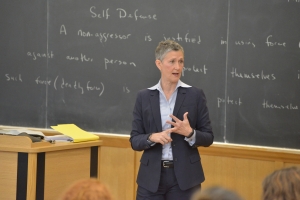
Office Hours: Aliaa Bassiouny The Lawrence Term Associate Professor of Finance uses her expertise in financial training and emerging markets to simulate real-world settings in the classroom.
“There’s a lot of science in finance and in business in general. But a lot of it is arts, which comes from the liberal arts.”
~ Aliaa Bassiouny, Lawrence Term Associate Professor of Finance
Finance and Liberal Arts
Imagine if you are just in a silo of studying one specific discipline without being able to access the knowledge from the other classes.
You can’t be in finance and manage your money—or someone else’s money—unless you really understand how businesses work. You need to understand how psychology works. You need to understand how the economy works, but you also need to understand specific things about history.
There’s a lot of science in finance and in business in general. But a lot of it is arts, which comes from the liberal arts—this way of appreciating how everything is connected, so that you are able to make decisions and evaluate and solve problems.
I’m very passionate about this. I think it’s very important, because it creates this well-rounded individual, regardless of whether they end up in a professional career like finance.
Savvy Students
This has to be one of the highlights of the job here: I love working with the Williams Investment Society. They are a very driven, motivated group of students who are very accountable for managing part of the endowment.
My only role is an advisory role. The entire recruitment process is student-driven; the entire investment process is following the constitution of the society, but it’s also student-driven. You get a group of students every year, they haven’t yet taken classes in finance; some of them haven’t even taken accounting or economics—but they are driven by self-learning.
You have a group of students who are willing to do that all by them- selves. They are going to end up taking classes in economics and business. But throughout their tenure in the society, they’re learning on the job, learning by doing.
Case Studies
I teach a course in multinational business finance. This is directly related to my own area of research: interna- tional financial markets, with a focus on emerg- ing markets.
I had my students do a joint assignment with students at The American University in Cairo. It’s 2016. You are an American company in Egypt, and then you suddenly have a currency crisis and a capital control crisis. You can’t get your money out of Egypt, so what do you do?
They start discussing it with students in Egypt, because they were there, and they were living through it. You get this cultural appreciation; you get thisbusiness appreciation just through the context. They could have read about that in a paper, but how do they appreciate that?
Working in emerging markets is not just about the science, or the textbook, or the models. It’s also about human interaction: managing crises, and politics, and language barriers, and time barriers, and so on. It gives a very different perspective.
Small School, Big Reach
We love Lexington and the university so much. I came for one semester as a visiting professor, but I already knew I wanted to move to the tenure track.
Our best friends live in Vietnam. We hadn’t seen them since COVID, and one time when we were catching up, they told us, “We were in the pool near our house in Vietnam. We bumped into someone and we were chatting. We were like, ‘Where did you go to college, was it American?’ He said it was a small university in Virginia. Our friends asked, “Was it Washing- ton and Lee?” And he was blown away.
W&L continues to surprise us. It’s a very small institution, but with a very big reach.
Training & Teaching
Executive education is when you work with professionals to train them. I’ve done that in Egypt every summer. A lot of the material that I’ve developed in my training is what I bring back to my classroom.
The first course in finance is called Managerial Finance. Anyone who wants to understand the basics of finance will take that class.
I have a project in that course where I work with them on something that I developed while I was doing the training, which I call my “su- per-simple startup models.” OK, so you have this business idea. What could go wrong, and how are you going to deal with it? A lot of that stuff is not in textbooks, except in a very abstract term.
I continue to have a lot of involvement outside W&L. This involvement is always something that’s enriching. I always bring examples from that to the classroom.
More about Aliaa
- She is the Lawrence Term Associate Professor of Finance; Middle East and Southeast Asia Studies Program affiliate faculty; and a faculty advisor for the Williams Investment Society.
- Bassiouny joined W&L as the Griffith Distinguished Visiting International Professor of Business Administration before accepting her current role. She previously served on the faculty of the American University in Cairo.
- Her experiences range from working as a finance trainer for Goldman Sachs’ 10,000 Women program in Cairo to delivering a lecture series on investments as part of Kendal at Lexington’s Kendal College program.
 Aliaa Bassiouny, the Lawrence Term Associate Professor of Finance
Aliaa Bassiouny, the Lawrence Term Associate Professor of Finance

You must be logged in to post a comment.